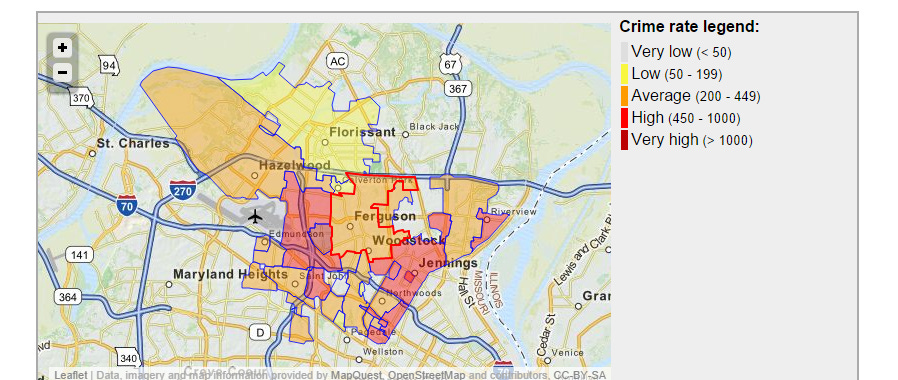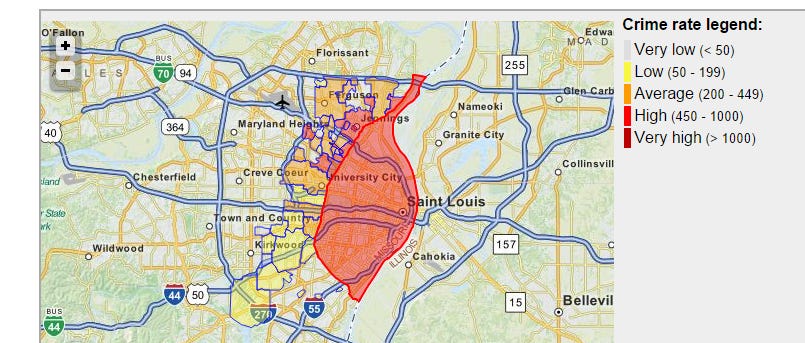Where did Ferguson come from?
As the events in Ferguson, MO, unfold, I have been watching for some time. Every couple of days in the Criminal Justice class I'm taking, we have talked about it, and yesterday we had a lengthy discussion as the rioting was still spinning out of control. I see it continues today, with the total at something like 27 businesses burned. I'm not yet ready to write on it in depth, but I have seen several resources either directly or indirectly related that I'd like to link together in this post for thoughtful readers who can make their own conclusions.
Indirectly, this essay by Jerry Pournelle is very close to what's going on in Ferguson. There is more, much more, at the link and I highly recommend looking at it all. The crab-bucket theory applies, and in the class discussion I brought it up and was surprised to find that the majority of my classmates and my professor didn't know it.
More than forty years ago when I was a city official in the Mayor’s office, I was asked to sit in on a meeting with the precinct captain of a district that included both black middle class and some “Inner city” “ghetto” areas. The meeting consisted of the police officers and several black women who were tired of the lack of law and order in their neighborhood. The captain explained that he had not more resources: he had patrols on overtime as it was. There was nothing to be done. I offered to send some of the Metro units in. These were elite police patrols who strictly enforced the law. I warned the ladies that if we sent them in, they would come down hard on all criminal activity they saw. All of it. The ladies said that was very much what they wanted.
We sent some of the elite Metro units into the neighborhood. They began enforcing the law as they had been trained: not as community police, but as strict enforcement officers looking for good arrests. This was before Wilson’s “Broken Windows” theory became widely known, but I knew Wilson, and this was in that spirit: you don’t ignore minor infractions because that leads people to think you will ignore major ones.
The experiment lasted about a month, and the ladies reported they were really surprised at how much better conditions were; but there were black leaders who claimed that the district was being overpoliced. The LA Times talked about the invasion of the police. The mayor told me to get the Metro units out of there. Things went back to where they were before I attempted to intervene. Read the rest here... In anticipation of the furor, the Prosecutor took an unusual step and released all the transcripts and documentation of the Grand Jury proceedings immediately following the announcement of the finding. You can find comprehensive links here. Consider that the Grand Jury had to have known that not finding against the police officer would make more trouble than indicting him. The Federal government has already threatened them. But they weighed the evidence, and made a difficult decision.
The inimitable Larry Correia took the time to write a lengthy and excellent article about the legality (or not) of shooting someone. I cannot recommend it enough. Below is a snippet that relates closely to the Ferguson incident.
Reasonable Man – I will often refer to this. The question isn’t whether the shooter perceives themselves to be justified, but whether a “reasonable man” would perceive you to be justified. Contrary to popular opinion, you can’t just say “he was coming right at me!” and be justified in shooting somebody. The evidence will be examined and the question will be if you made the assumptions a reasonable man would make, and acted in a manner which seems reasonable based on that evidence. This is where the jury comes in, because they are a group of reasonable people who are going to look at your actions and your situation and make a call. Basically, do your actions make sense to them? Would they believe similar things in the same situation?
To be legally justified in using lethal force against somebody you need to meet the following criteria.
They have the Ability to cause you serious bodily harm.
They have the Opportunity to cause you serious bodily harm.
They are acting in a manner which suggests they are an Immediate Threat of serious bodily harm.
If your encounter fits these three criteria, then you are usually legally justified in using lethal force. Finally, a data tool my criminal justice professor introduced us too is very interesting, when you compare the crime rates of Ferguson to the nearby city of St. Louis. This is not a town known for high crime, regardless of what the media has spun into legend.

Click on photo for more data




